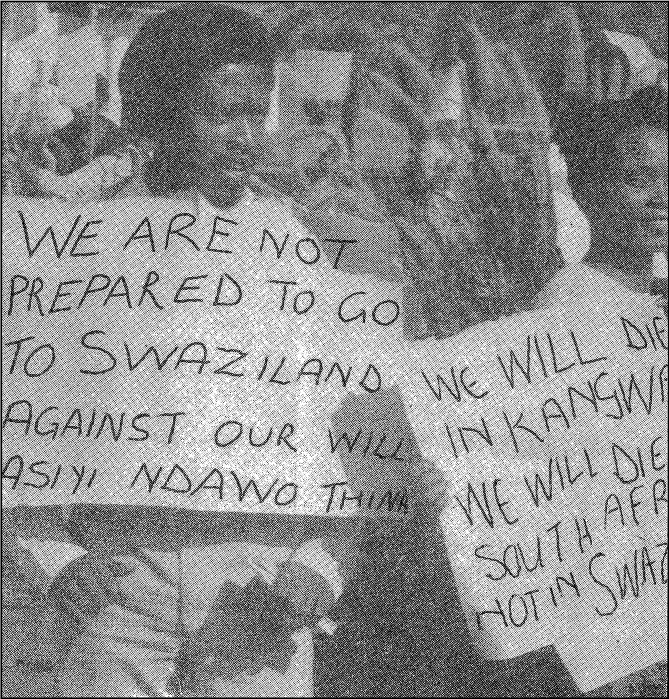Originally published in Inqaba ya Basebenzi No. 7 (August 1982) as part of the “Southern Africa Notes” feature.
by Gerald Desai
The decision by the SA government to hand over KaNgwane and the Ingwavuma district of KwaZulu to Swaziland, and the dissolution of the KaNgwane toy ‘government’, has left the Bantustan collaborators wailing with powerlessness.
The matter has been taken to the courts in an attempt to stop what the apartheid regime is doing. But in spite of these protests and legal wrangles, the SA government seems poised to bulldozer ahead.
That the land deal is motivated by the government’s desire to “bring together those whom history has set apart” (a former Natal MP, Botha) is a deliberate lie. The SA ruling class and its apartheid government have always set themselves against democracy and national unity.
What is the real purpose of this deal? Faced with the swelling movement of the SA workers and oppressed, the SA government is trying to speed up ‘Bantustanisation’ – and turn it in new directions.
For the people of KaNgwane and Ingwavuma the deal will mean the loss of SA citizenship, and as Swazi citizens they will face greater difficulties when seeking employment in SA industries and farms. The SA government wants to shift the responsibility for these people onto the Swazi government, where serious unemployment problems already exist.
Already the fear is being expressed that, once the land deal is through, the people of Ingwavuma and KaNgwane will be treated as second-class Swazi citizens, and may even lose jobs they are holding at present. In this way the plan is designed to divide the working class in order to escape the political problems which will arise out of widespread unemployment and poverty.
It may also be an attempt at rejuvenating tribal conflict to divert the attention of the masses from their appalling conditions.

The new feature of this action is the attempt to draw Swaziland more closely under the Bantustan umbrella. In part this is to cover over the absurdities in giving ‘independence’ to the tiny remaining non-independent ‘homelands’. Already rumours are circulating of a future deal with Lesotho over QwaQwa – and even of a link-up between Bophuthatswana and Botswana.
Moreover this is an attempt by the SA government to gain international recognition for its Bantustans. Swaziland is a member of the UN and the OAU – and the SA government hopes it will serve as the thin edge of the wedge to gain recognition for Transkei, Bophuthatswana, etc.
Swaziland’s acceptance of the deal will certainly add to the confusion and division within the OAU. Its charter demands that old artificial colonial borders imposed by imperialism be respected (!) – but its next chairman, Gaddafi, has already supported the land deal!!
Sobhuza and his government have accepted the deal because it adds to their territory, gives them access to the sea, and has been sweetened by promises of financial and technical development assistance by the SA government.
But none of this offers any way forward for the people of Swaziland. The increasing crisis of the SA capitalist economy will gradually sap the ability of the SA government to prop up the Swazi rulers with ‘aid’. The economic dependence of Swaziland on SA will mean that any new port in Kosi Bay will have to compete for trade with Durban, Richards Bay and Maputo.
In fact the new deal is likely to lead only to tightened SA political control over Swaziland. If an attempt is being made, as is suggested, to create a buffer against guerrilla incursions, then this will inevitably come to involve increased SADF activity in Swaziland itself. This will in turn allow the SA military to be used against the Swazi working class as it reawakens to carry forward its history of militant struggle.
Already Koornhof has secretly promised Mabuza, the KaNgwane puppet, the deputy premiership of Swaziland.
The workers’ movement vehemently opposes this land deal and any further fragmentation of SA by the regime.
Southern Africa has already been made into one economic whole, with one working class enslaved by the domination of the SA capitalists. At the same time, the political fragmentation of the sub-continent has thrown up barriers to the development of production.
Capitalism is incapable of the unification of Southern Africa.
The only way forward for the working people of Swaziland, South Africa and the whole of the sub-continent lies in joining together under the leadership of a unified and organised working class to overthrow capitalism, create conditions for genuine self-determination, and rid society for ever of the rule of feudal remnants like Sobhuza and modern dinosaurs like P.W. Botha.
On the basis of a federation of socialist states of Southern Africa, the resources of the entire region could be used also for the benefit of the impoverished masses in backward areas like KaNgwane, KwaZulu and Swaziland.
© Transcribed from the original by the Marxist Workers Party (2022).
